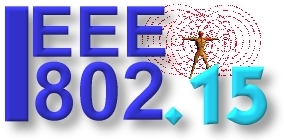

 |
 |
Candidate technical proposals are
requested for the IEEE P802.15.3 Wireless Personal Area NetworksÔ
High Rate standard. This Web page
also describes the process and requirements for responding to this Final
Call.
Proposals shall be Physical (PHY) Layer, Medium Access Controller (MAC) or System (both). For your convenience we have provided a Zip archive of the complete 802.15.3 Final CFP Distribution Package, in Zip (103KB) or the individual files can be downloaded:
The Call for Intent is a process in
which all interested parties are asked to identify their intention to submit
proposals. YOU
MUST DECLARE YOUR INTENT. You
may decide later, if necessary, to retract your intent, but it must be declared.
The purpose of this call is to enable scheduling for the July meeting,
and assignment of document numbers. All
submissions must be submitted on or before July 10, 2000, although scheduling
problems may delay some presentations until the September 2000 interim meeting.
The meeting
venues and agendas are posted 30 days before the meeting.
Please describe the scope of your proposal (PHY, MAC, System), a general description of the PHY and/or MAC approach, company affiliation, title, and contact information. Provide enough data to help the secretary schedule similar proposals at the same meetings. The WPANÔ High Rate Task Group 3 Letter of Intent "sample letter" must be used to create your letter of intent.
The IEEE P802.15.3-High Rate Task Group 3 is chartered to create a draft standard based on its approved Project Authorization Request (802-15-3.pdf) and Five Criteria document (99166r2P802-15_HRSG-5Criteria.doc). The requirements have been collected and defined in the approved Criteria Definitions document (00110r9P802-15_TG3-Criteria-Definitions.doc). Respondents need to download these documents (see above) to understand the CFP.
All submissions to the CFP shall be formatted to include the IEEE format with cover page. The cover page releases the submission to the public use of the IEEE and the submission will be posted to the 802.15 web site. Relevant patents do not need to be disclosed, but their existence will need to be declared and made available for “fair and reasonable licensing without prejudice” in order to be considered for this standard.
The WG Rules apply for all submissions more info can be found here. Additionally, here is a quick summary of the logistics for submission handling:For general questions or procedural help
with your submission please contact the TG3 officers listed at the end of this
document. All submissions
should be submitted to the TG3 Secretary with a copy to the TG3 Chair for
process backup.
Documents that are already in the IEEE archives can be resubmitted by making a written request (e.g. e-mail) to the TG3 Secretary including the IEEE document number. Modified documents should be resubmitted as new, with updated revision numbers in the document and file name. In both cases, be sure the contact data is up to date.
The TG3 Secretary will make the final scheduling decision with the aid of the WG Advisory Core. If the submitter has a special scheduling need, they should advise the Secretary. Scheduling needs of submissions by consortia or groups may be given schedule priority. Some effort will be given to grouping similar proposals. Due to the volume of proposals, presentations will probably be limited to 30 minutes each. A System (PHY and MAC) proposal will be allotted two 30 minute time slots. Multiple MAC or multiple PHY proposals from a single presenter are discouraged. It is expected that the presenter will pick and submit the best of multiple proposals prior to the meeting. The meeting venues and agendas are posted on the web.
The evaluation criteria from the Criteria Definitions document (IEEE P802.15-00110r9 or higher version), will be used to evaluate the proposals. It is recommended that the presentation be a 30 minute description of the proposal which addresses the key criteria and advantages of the proposal. An additional support document can be submitted to explain the details. Each submission shall contain a self-evaluation of the Evaluation Matrix (section 5 of the Criteria Definitions document). The amount of detail and supporting material is expected to vary widely between submissions. More complete submissions could improve a proposal’s rating.
Evaluation of the proposals, clarification of the criteria, and evaluations will be done between meetings at the Tuesday ad hoc conference calls. Teleconference meetings and agendas will be published in the The WG Public Mailing List stds-802-wpan@ieee.org archives which are available on the Web. To sign up for the General Mailing List, please submit your requests here. An immediate goal will be to reduce the number of proposals as rapidly as possible. All recommendations, conclusions and group business needing ratification will be handled at the beginning of each Plenary or quorum Interim Meeting.
Voting on the final proposal requires 802.15 voting rights. Voting rights may be obtained by participating in 802.15 sessions at two out of the last four 802 Plenary meetings. One Interim 802.15 meeting may be substituted for a plenary meeting. Voting rights will commence at the beginning of the next plenary meeting attended. Participation is defined as attending at least 75% of the sessions at a given meeting. As an example, a person attending the March and May meetings will attain voting rights at the July 2000 Plenary. A person attending the May and July meetings will attain voting rights at the November 2000 Plenary. Further information on these rules can be found in the IEEE P802.15 Operating Rules, in Adobe PDF (585KB)..
All submissions, letters of intent and/or questions should be forwarded to the Secretary.
| If you would
like to contact the IEEE 802.15 Webmaster, email to alfvin@ieee.org © Copyright 2000, IEEE. Terms & Conditions. Privacy & Security |
|
(alfvin@ieee.org)
URL:
http://ieee802.org/15/pub/TG3/CFA_CFP.html
(Modified: 05-Feb-2004
), Rev. 0.1